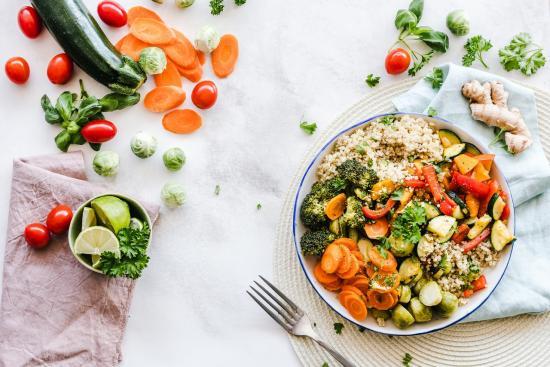Nutrition for Immune Health
Now, more than ever, is the ideal time to invest in improving our nutrition. Not only are the majority of us spending more time at home, with opportunities to cook and explore new recipes, but good nutrition is critical to strengthen the immune system and reduce our chances of viral infections. Afterall, our immune system comprises numerous proteins and requires vitamins, minerals and a whole host of other nutritional compounds to coordinate up-regulation and attack of foreign bodies, such as viruses, that we may encounter.1
The fundamental elements of a good diet for immune health include:
- Abundant vegetables and fruit: Aim to eat a wide variety that includes all colors of the rainbow, which is indicative of the different nutrients and phytonutrients they contain. Fresh and frozen vegetables are best in terms of nutritional quality. Try to include some vegetables at every meal to help meet your micronutrient goals. This can take the form of salad, homemade soup, juices and smoothies, or cooked as part of a main dish. We are fortunate here in Southern California that fresh produce is abundantly available during this time when pantry goods may be in lower stock. Several smaller farmer’s markets remain open too, which is a great opportunity to purchase fresh, seasonal produce outside of grocery stores, while also supporting your local farmers!
- High quality protein: Amino acids, the building blocks of all proteins, are essential to create many elements of the immune system and maintain its optimal functioning. The best animal protein sources include bone broth, grass-fed or pasture-raised meats, fish and seafood, pasture-raised eggs. Plant protein sources include beans and legumes, nuts and seeds, and soybean based products such as tofu and tempeh. An added benefit of most protein-rich foods is that they also contain the immune-boosting mineral zinc. Consuming approximately two 4 ounces servings of protein rich-foods foods per day will support immune functioning.
- Reduce or eliminate simple sugars and highly processed foods: During times of uncertainty, anxiety, fear or boredom, we often reach for the high sugar, processed snacks (e.g. candy, cookies, chips) and low-fiber starchy foods (e.g. white bread, pasta). Not only do these foods provide little to no nutritional value, but the elevated blood sugar response after eating them actually suppresses the immune system and makes us more vulnerable to infections. Furthermore, if we do get sick, raised blood sugar levels from frequently consuming these foods could prolong and increase the severity of an infection.2
- Probiotic and prebiotic foods: The gut microbiota is a very important part of our immune system as healthy bacteria and other microbes in our gut help to recognize and fight off harmful infectious agents, such as viruses. We can support a healthy gut microbiome by eating fiber-rich foods such as vegetables, fruits, nuts, seeds, beans and legumes, and by avoiding simple sugars and processed foods as mentioned above.
Particularly beneficial fruits and vegetables that help feed the good bacteria in our guts (i.e. prebiotics) include:
- Artichokes
- Asparagus
- Apples
- Banana
- Dandelion greens
- Flaxseed
- Jicama
- Onion family e.g. white/red/green onion, leeks, garlic





















